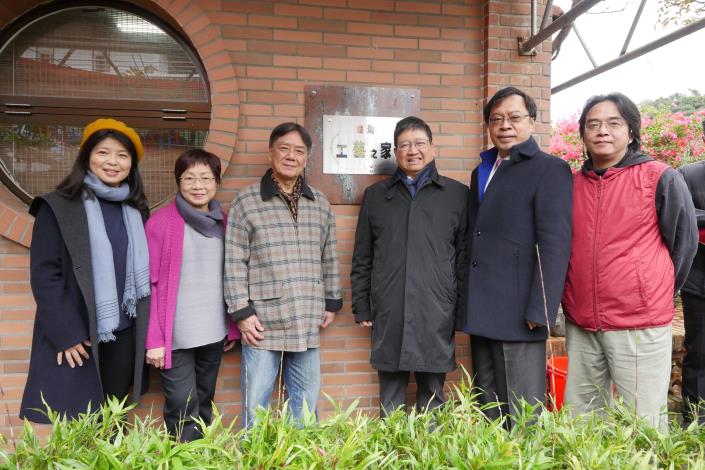
Weng Ming-chuan was awarded the 6th Taiwan Crafts Workshop by the National Taiwan Craft Research and Development Institute. The unveiling ceremony was held today (8th), at the LeZhuZhai Bamboo Workshop (No. 47-1 Mawudu, Jinshan village, Guanxi Township). Hsinchu County Magistrate Yang Wen-ke, National Taiwan Craft Research and Development Institute Director Hsu Keng-hsiu and others attended the unveiling ceremony. County Magistrate Yang also personally presented a certificate of recognition to crafts master Weng Ming-chuan, and said that there are many craftsmen in Hsinchu County. Crafts master Weng used to work as a TV art director and found his second career in bamboo sculpturing after his retirement. Winning this recognition is not an easy feat, and Magistrate Yang thanked crafts master Weng for his dedication to crafts. In the future, the county government will install attractive roads signs to roads in areas around the nine Taiwan Crafts Workshops to make it more convenient for visitors to find the workshops.
To date, nine craftsmen in Hsinchu County have been certified by the Taiwan Crafts Workshop. In addition to crafts master Weng Ming-chuan who has been honored with the title of Taiwan Crafts Workshop, others include Tseng Ding-yu (wood sculpturing) from Zhudong, Zhu Chin-cheng (printmaking) and Huang Pao-lin (ceramics) from Xinpu, Cheng Chieh-ho (stone sculpturing) from Guanxi, Cheng Yung-kuo (ceramics) and Chiu Chien-ching (ceramics) from Emei, Peng Kun-yen (lacquer art) from Beipu, and Chen Wei-en (ceramics) from Xinfeng. The Taiwan Crafts Workshop is a certification mechanism promoted by the National Taiwan Craft Research and Development Institute for outstanding crafts persons to promote public awareness of the craft creation environment in Taiwan. The workshops are integrated with tourism, making them into places for visiting and experiencing learning, and craft and cultural bases.
Crafts master Weng Ming-chuan specialized in applied art design when he was a student. After graduating, he found his career in TV art for more than 30 years. When faced with costumes and props for ancient dramas, he often had to do research. Due to work pressure, he learned to appreciate tea to relieve his stress, and began to develop an interest in the innovative peripheral products of tea appreciation. He believes that the art of bamboo carving is a profession on its own, but has been isolated from daily living when it should have been based on the needs of the real environment.
Crafts master Weng said that today is an interweave of traditions and new generations. Therefore crafts must address how the direction and type of creations can adapt to the modern environment and attract modern people. He looks forward to innovating from tradition by "creating simplicity from complexity." Simplicity and plainness is the essence of Chinese culture and the foundation of exquisiteness. His subject matter diverges from the traditional landscape, flowers and birds, and incorporates the aesthetics of western Bauhaus style. Based on three-dimensional geometric shapes, his creations instill a sense of peace in people. The tea setting is principal to "tea appreciation." It is also the overture to tea tasting, and the direction for creative efforts.